Nikole Hannah-Jones, creator of the 1619 Project, spoke to a crowd of more than 350 people at Lehigh’s Zoellner Arts Center on Oct. 11.
The 1619 Project is a multimedia journalistic endeavor including work from a number of academics, journalists, historians and more. The project, originally featured in The New York Times Magazine, has led to a podcast, classroom curricula, a best-selling book edited by Hannah-Jones and a children’s picture book.
Hannah-Jones was originally set to speak at Lehigh in 2019, but COVID-19 disrupted this plan, English professor Stephanie Powell Watts said.
At the beginning of her speech, Hannah-Jones asked the crowd, “How much better would we understand our country if we didn’t think about our founding, as our origins, as 1776, with the vaunted idea of liberty, (but) if we actually thought about our origin as 1619 when we began the institution of African slavery in the original 13 colonies?”
Throughout her speech, crowd members reacted both verbally and physically, murmuring affirmations and nodding their heads as Hannah-Jones spoke. They also laughed at her jokes, of which she made many.
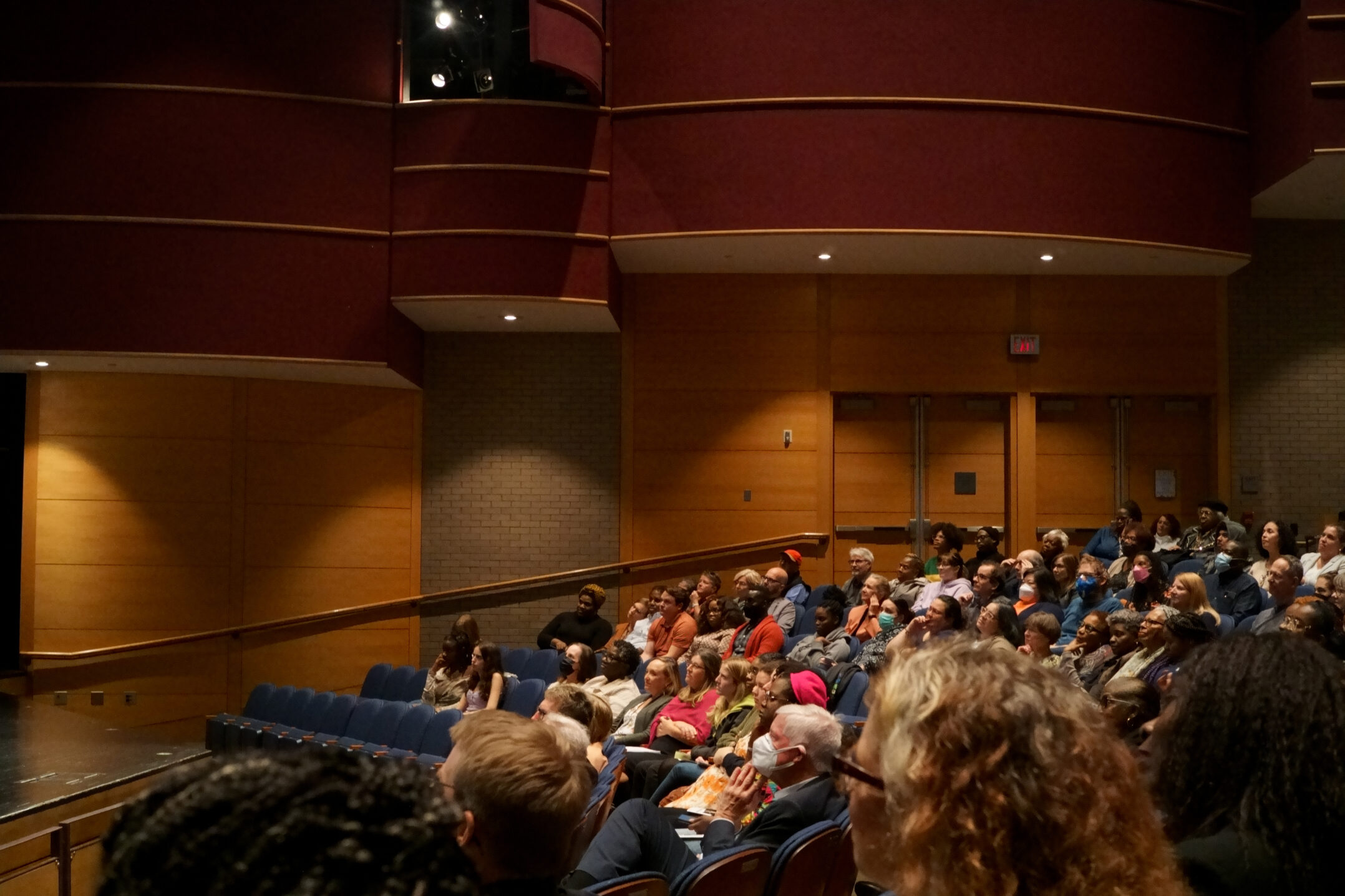
Nikole Hannah-Jones, creator of the 1619 Project, spoke to a crowd of more than 350 people at Zoellner Arts Center on Oct. 11. (Hongyu Liu/B&W staff)
Hannah-Jones said making jokes is a defense mechanism, and when she is worried or stressed, she makes jokes. She said she does this often because the things she discusses are difficult, and jokes help to disarm people.
After the project’s initial launch in The Times Magazine in August 2019 — the 400 year anniversary of slavery in the United States — Hannah-Jones said people began not only to criticize the project, but to legislate against it.
In December 2019, five historians wrote a letter to the magazine disputing what they said were factual errors in the project, namely the project’s assertion that America’s founders declared independence from Britain to ensure the continuation of slavery.
The letter’s signatories took issue with the project’s presentation “as an authoritative account that bears the imprimatur and credibility of The New York Times,” instead of the views of individual writers. The signatories asked the magazine to make corrections “of all the errors and distortions in the 1619 project” and to “reveal fully the process through which the historical materials were and continue to be assembled, checked and authenticated.”
Jake Silverstein, editor in chief of The Times Magazine, defended the project’s veracity in a response, writing that the request for corrections was not warranted. He also defended the project’s methodological processes, citing a process of consultation with “numerous scholars of African American history and related fields.”
Hannah-Jones did not address this particular dispute during the lecture, but she did acknowledge the legislative response to the project.
In June 2021, Arkansas Sen. Tom Cotton, with the support of then Senate majority leader Mitch McConnell, reintroduced the Saving American History Act of 2021, which sought to cease federal funding for schools teaching 1619 Project curriculum.
One of the bill’s clauses reads, “The Federal Government has a strong interest in promoting an accurate account of the Nation’s history through public schools and forming young people into knowledgeable and patriotic citizens.”
Hannah-Jones said “patriotic” is a key word.
“To argue that in a country where Black people were brought to be property, not citizens, not treated as humans, had no protection of the law, were not part of our founding documents … that we could actually believe in this country and fight for this country and actually fight to make those democratic ideals true for everyone is literally the definition of the highest quality of patriotism,” Hannah-Jones said.
She said it is not the role of educational institutions to create patriotic citizens and Americans would look at such laws as authoritarian were they enacted in other countries.
The Saving American History Act is just one of many bills that has embroiled American lawmakers in the war for classroom curricula. Hannah-Jones referred to existing bans of 1619 classroom materials in Florida and Texas, and said two-thirds of states in the nation have passed or have considered passing bans against the 1619 Project curriculum or critical race theory in the classroom.
Hannah-Jones said these laws are not actually anti-critical race theory or anti-1619 Project, but they are memory laws. She questioned why a country like the United States, which she said was founded on slavery, would ever want to grapple with the truth of what it was.
“We have told ourselves that we are an exceptional nation,” Hannah-Jones said. “The freest country in the history of the world. It’s right there in our founding documents: ‘We hold these truths to be self-evident, that all men are created equal’ … even as the man who wrote those words owned 200 human beings at the time.”
Hannah-Jones said these are laws proposed to collectively shape how we see our society in order to justify the society we have.
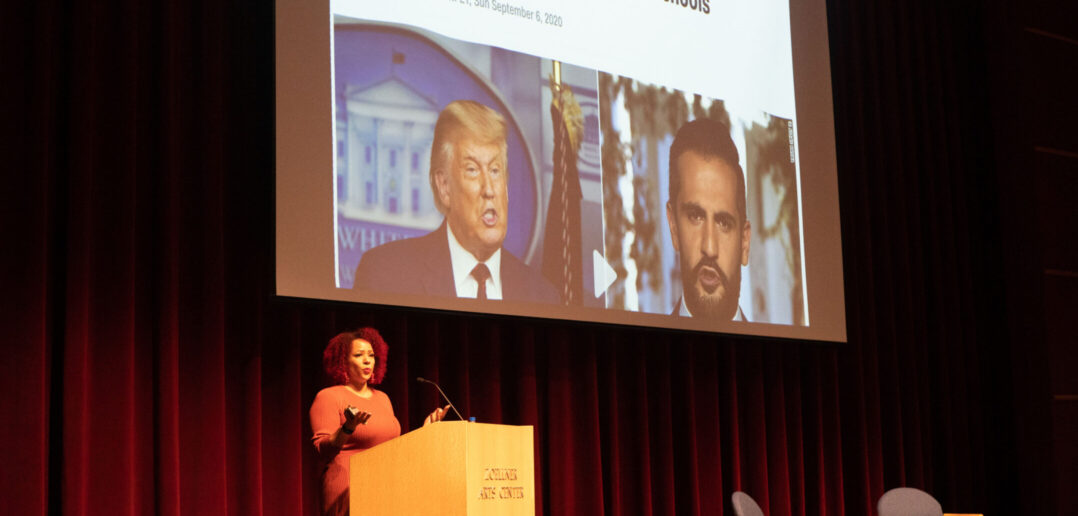
Nikole Hannah-Jones spoke about the 1619 Project, the project’s public reception and the state of American democracy at Zoellner Arts Center on Oct. 11. (Hongyu Liu/B&W staff)
From March to June of 2021, Fox News mentioned critical race theory 1,771 times on the network’s shows. In June alone, critical race theory was mentioned 901 times. In the nine months prior to March of that year, the term was mentioned only 18 times per month on average.
Hannah-Jones said its sudden prevalence was the result of a highly successful propaganda campaign.
“All (propaganda) has to do is tap into an emotion and tap into a political division that you’re already primed to succumb to,” Hannah-Jones said. “That’s what Fox News did. That’s what Republican operatives did. Why did they know it was going to be successful? Because race is the oldest wedge issue in America.”
She referenced Bacon’s Rebellion, a colonial uprising in 1676 in which white and Black indentured servants and slaves united to form a militia and burn down a settlement in Jamestown, Virginia.
After the rebellion, Virginia lawmakers began to pass laws that distinguished white people from Black people. Hannah-Jones said these laws would forever separate poor white people from poor Black people.
“How do we know … when the elite start to see coalitions of Black, brown, white, Asian people coming together, that the way to divide that is to sow seeds of racial discontent? It’s because we are primed to do that,” Hannah-Jones said. “We have been doing that for centuries, since the 1600s.”
The state of current American democracy was a recurring topic in her speech.
Hannah-Jones began her lecture by saying the country is in a perilous moment. She said we are seeing signs of eroding democracy, as evidenced by the attempt to overthrow the 2020 presidential election, recent gerrymandering and Supreme Court packing.
“The picture we have of ourselves as a country is not matching with the reality of what’s happening on the ground,” Hannah-Jones said.
Vera Fennell, a political science professor who attended the event, said she was pleased Hannah-Jones was not optimistic about the future of America’s democracy.
Fennell said she isn’t, either.
She used voting processes as a way to analyze the trajectory of current American politics. To her, votes being miscounted or considered inaccurate based on the winner of the election highlights systemic problems.
“You have to vote,” Fennell said. “But we’re in too deep a hole for voting to be the end-all and the be-all. More definitely needs to be done.”
Fennell said education is a part of it and people must be educated about American history, but she isn’t sure what “more” will continue to resemble.
“The kind of people that professor Nikole Hannah-Jones was talking about, who are afraid of the truth and think that it will only encourage disunion, I think are wrong,” Fennell said. “I really do believe that the truth sets you free and that to know the accurate history will be better for all of us.”
Powell Watts compared political participation to tending a garden.
She said voting is not a one-and-done activity, and participation is about wanting what’s best for yourself and other people.
“When you have a garden, and you worked really, really hard at it, and you spent hours weeding and planting, and you’re so proud of yourself and you’re exhausted, a couple weeks later, you’re going to have to do some of that work again,” Powell Watts said. “That’s the kind of mindset that’s really hard to adopt. This is a fight that you’re going to have to be a part of for the rest of your life.”
Comfortable with the Uncomfortable
In her lead essay for the 1619 Project, Hannah-Jones tells the story of Isaac Woodard, a Black World War II veteran who was brutally beaten and blinded by police officers in 1946 after being honorably discharged from the army.
Woodard was dressed in his military uniform when South Carolina police officers struck him over the head with billy clubs until he became unconscious.
Mary Elizabeth O’Connor, an Allentown resident who attended the speech, was born in 1937 — two years after the beginning of World War II — and said she remembers troops coming home to the United States after the war. She said the Black community sacrificed a lot in World War II, and got very little recognition for doing so. That treatment made her interested in issues of substantial racial equality.
O’Connor said she came to Lehigh for Hannah-Jones’ lecture because she is concerned about racism on Lehigh’s campus. She said she loves colleges and universities, but they need to be more mindful of equality and sensitivity regarding topics such as these.
“I’m tired of the concept of higher education when they’re low-balling too many people,” O’Connor said. “I am very concerned about higher (education) leadership. The priority of money (and) the true vileness of pulling people into educational settings that really don’t give them what they’re paying for.”
She said events like Hannah-Jones’ lecture, which are open to the public, are important gestures that reach out not only to students, faculty and administrators but to the entire community.
She believes colleges and universities must provide leadership, particularly in social areas, to their local community.
“I’d like to see more impact on social justice and community outreach from every college and university, but in particular, high on the hill stands Lehigh,” O’Connor said. “I think they might want to slide down the hill a little bit and get together with all of us.”
Powell Watts, who helped schedule the lecture, said it is vital for universities to provide this kind of intellectual stimulation for both students and community members.
She said it is important for students to learn how to become citizens at this point in their development and these kinds of engagements can help with that.
“The university is the place that you go to to try out new ideas, to think about things you maybe hadn’t thought about before, to take on some new points of view that you maybe hadn’t thought of before,” Powell Watts said. “Those kinds of conversations need to happen. That is our role in the culture.”
O’Connor said every opportunity to chip away at social ignorance and inequality is worthy.
During her presentation, Hannah-Jones said crowd members would likely feel uncomfortable several times during the talk.
O’Connor said being uncomfortable can be fun for her.
“Fun for me is energizing,” O’Connor said. “Inclusivity is energizing. One of the things that I really value is the speaker acknowledging the awkwardness that many of us feel as humans in contexts that might not be comfortable. One of the benefits of the dialogue was that we did engage in candid and uncomfortable dialogue.”

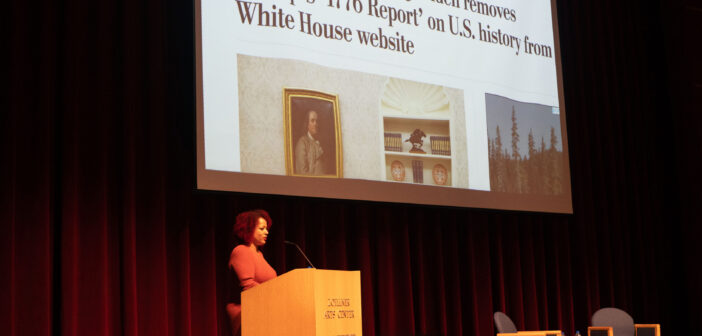

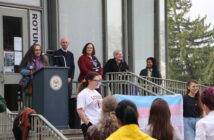
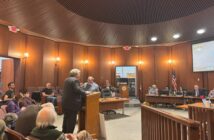

Comment policy
Comments posted to The Brown and White website are reviewed by a moderator before being approved. Incendiary speech or harassing language, including comments targeted at individuals, may be deemed unacceptable and not published. Spam and other soliciting will also be declined.
The Brown and White also reserves the right to not publish entirely anonymous comments.
2 Comments
So Lehigh University, the once esteemed institution, is hosting and promoting a Marxist organization and Marxist ideology? You are losing a lot of donors and a lot of respect. Shame on you.
Creating division by race or other means is indeed the foundation of Marxism. Hannah-Jones on the Lehigh campus continues to fester this message to divide America. Lehigh faculty & administration lost its alumni base 25 years ago as they moved in this direction.